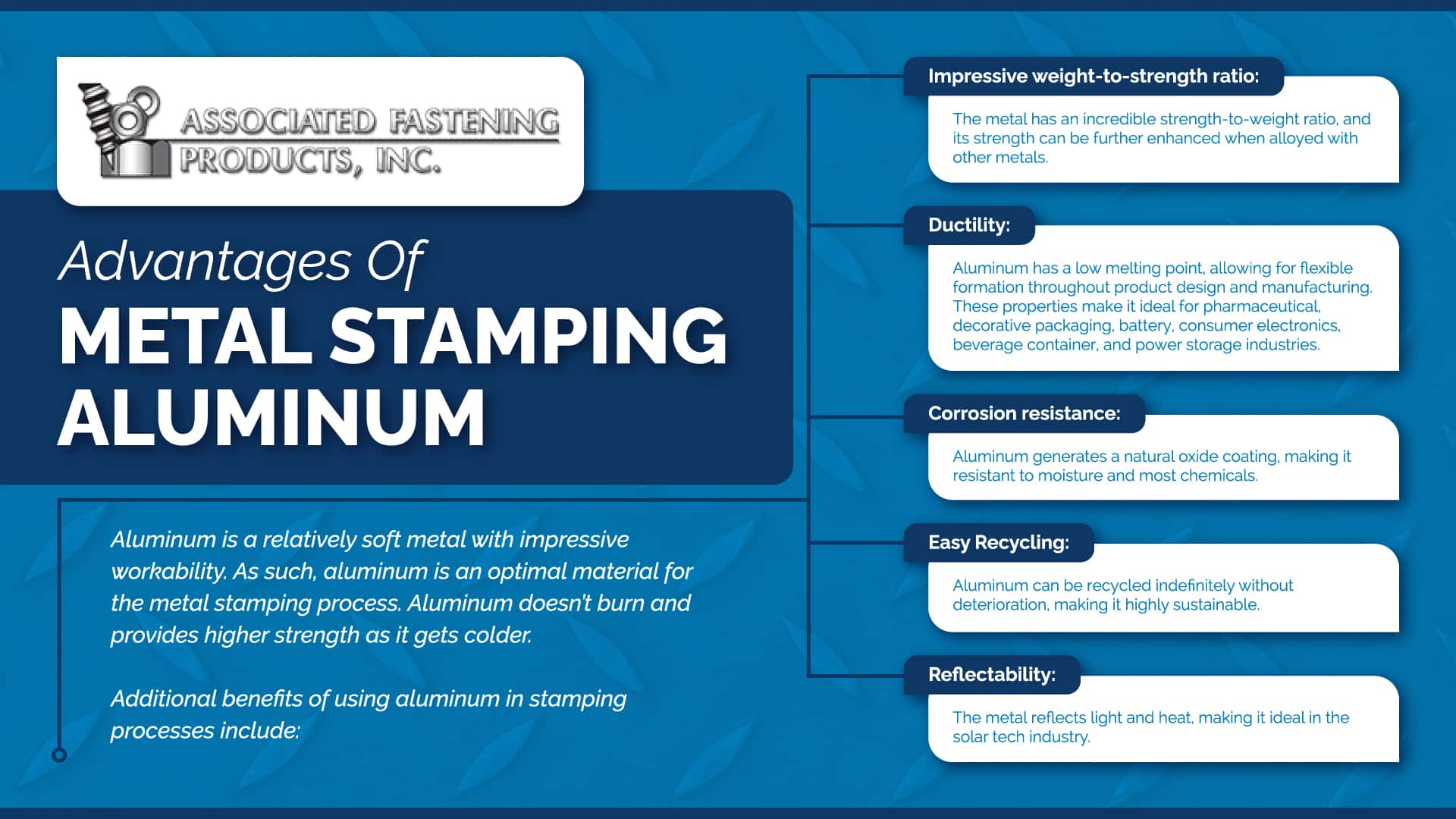Metal stamping is a metalworking technique that uses sheet metal to form different components and products. The process accommodates multiple materials, including aluminum. Stamped aluminum components are widely used in components across industries such as medical, aerospace, marine, automotive, electronics, and many more due to aluminum’s workability and strength.
The aluminum metal stamping process involves various methods of converting the metal into different parts according to a user’s precise specifications. Commonly used alloying materials in aluminum metal stamping include magnesium, iron, and copper. When choosing a material for stamping, aluminum is often an ideal choice due to its excellent strength-to-weight ratio, conductivity, appearance, and more.

Aluminum Metal Stamping Process
Metal stamping encompasses several forming techniques used to convert a standard aluminum piece into specific parts that are custom-manufactured to the customer’s exact specifications. Different methods involved in the aluminum metal stamping process include:
- Blanking: Blanking is the process of using a die to cut workpieces out of an aluminum sheet metal piece. The process creates clean blanks that can be subjected to further processing using a stamping press or other machinery types.
- Piercing: Piercing implements a punch and die to create notches, slots, or holes into the part. Piercing produces tight tolerances that create cleaner cuts than drilling and is more efficient than laser cutting.
- Drawing: This process uses tensile force to shape components into desired shapes and thicknesses. This is done by slowly stretching the blanks over a die to manipulate them into a new shape. It is commonly used to create electronic components.
- Forming. Forming is a universal term referring to the techniques and processes used to shape or form blanks.
Advantages of Metal Stamping Aluminum
Aluminum is a relatively soft metal with impressive workability. As such, aluminum is an optimal material for the metal stamping process. Aluminum doesn’t burn and provides higher strength as it gets colder.
Additional benefits of using aluminum in stamping processes include:
- Impressive Weight-to-Strength Ratio: The metal has an incredible strength-to-weight ratio, and its strength can be further enhanced when alloyed with other metals.
- Ductility: Aluminum has a low melting point, allowing for flexible formation throughout product design and manufacturing. These properties make it ideal for pharmaceutical, decorative packaging, battery, consumer electronics, beverage container, and power storage industries.
- Corrosion Resistance: Aluminum generates a natural oxide coating, making it resistant to moisture and most chemicals.
- Easy Recycling: Aluminum can be recycled indefinitely without deterioration, making it highly sustainable.
- Reflectability: The metal reflects light and heat, making it ideal in the solar tech industry.
Commonly Used Aluminum Alloys for Metal Stamping
Pure aluminum is typically alloyed with other metals to strengthen some properties and improve the end product’s performance. The alloys are each assigned a unique 4-digit code depending on the primary alloying element.
Common types of aluminum alloys as used in the metal stamping process include:
- 1100: 1100 alloys have a minimum aluminum content of 99%. It is perfect for projects needing challenging forming operations due to its softness, ductility, and workability. 1100 has the highest thermal and electrical conductivity.
- 3003: This is the most commonly used aluminum alloy. It uses manganese to elevate tensile strength. It is mostly used for drawing, fuel tanks, spinning, and sheet metal work. In addition, it is corrosion-resistant and non-heat-treatable.
- 5052: It is the highest strength alloy of the non-heat-treatable grades. The alloy is highly resistant to saltwater corrosion, making it ideal for marine applications. 5052 alloys are suitable for creating intricate structures.
- 6061: This is the most versatile heat-treatable alloy. This alloy is corrosion resistant and has a variety of mechanical properties.
Industrial Applications for Stamped Aluminum Parts
Aluminum offers many properties beneficial to industrial applications. This material is extremely durable, flexible, and dimensionally stable, making it exceptionally versatile in terms of application. Industries that commonly use aluminum stamping include:
- Transportation
- Construction
- Packaging
- Chemical
- Electrical
- Electronics
Why Choose Associated Fastening Products Inc for Your Aluminum Stamped Parts?
At Associated Fastening Products, we handle everything from prototyping to production volumes. More importantly, we dedicate ourselves to ensuring client satisfaction and meeting your needs and specifications.
We also provide additional value-added services such as assembly, welding, plating, reverse engineering, kitting, customized shipping programs, warehousing, and special packaging. Contact us to learn more about our aluminum metal stamping services.
